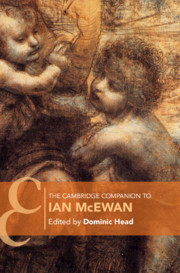Book contents
- The Cambridge Companion to Ian McEwan
- The Cambridge Companion to Ian McEwan
- Copyright page
- Contents
- Contributors
- Chronology
- Abbreviations
- Introduction
- 1 ‘Shock Lit’
- 2 Moral Dilemmas
- 3 Science and Climate Crisis
- 4 The Novel of Ideas
- 5 Cold War Fictions
- 6 The Construction of Childhood
- 7 The Public and the Private
- 8 Masculinities
- 9 The Novellas
- 10 Realist Legacies
- 11 Limited Modernism
- 12 Narrative Artifice
- Further Reading
- Index
- Cambridge Companions To…
2 - Moral Dilemmas
Published online by Cambridge University Press: 24 June 2019
- The Cambridge Companion to Ian McEwan
- The Cambridge Companion to Ian McEwan
- Copyright page
- Contents
- Contributors
- Chronology
- Abbreviations
- Introduction
- 1 ‘Shock Lit’
- 2 Moral Dilemmas
- 3 Science and Climate Crisis
- 4 The Novel of Ideas
- 5 Cold War Fictions
- 6 The Construction of Childhood
- 7 The Public and the Private
- 8 Masculinities
- 9 The Novellas
- 10 Realist Legacies
- 11 Limited Modernism
- 12 Narrative Artifice
- Further Reading
- Index
- Cambridge Companions To…
Summary
This chapter explores Ian McEwan’s stature as a contemporary British moral novelist by focusing on acute ethical dilemmas in five of his best-known works from the past thirty years: The Child in Time, Black Dogs, Enduring Love, Atonement and Saturday. Beginning with the dramatic episode of a tragic balloon accident in Enduring Love, the chapter analyzes discrete scenes of intense ethical conflict in each text, in which characters are torn between altruism and self-interest. These scenes are interpreted in the context of McEwan’s distinctly self-conscious aesthetic, which makes use of complex and highly ironic relationships between the narrator and the reader. By examining ethical representations in light of McEwan’s sophisticated narrative technique, the chapter argues that McEwan has helped to revive the moral novel for a new generation and has taken his place in the lineage of great moral writers in Britain reaching back to Daniel Defoe.
- Type
- Chapter
- Information
- The Cambridge Companion to Ian McEwan , pp. 29 - 44Publisher: Cambridge University PressPrint publication year: 2019
- 3
- Cited by

